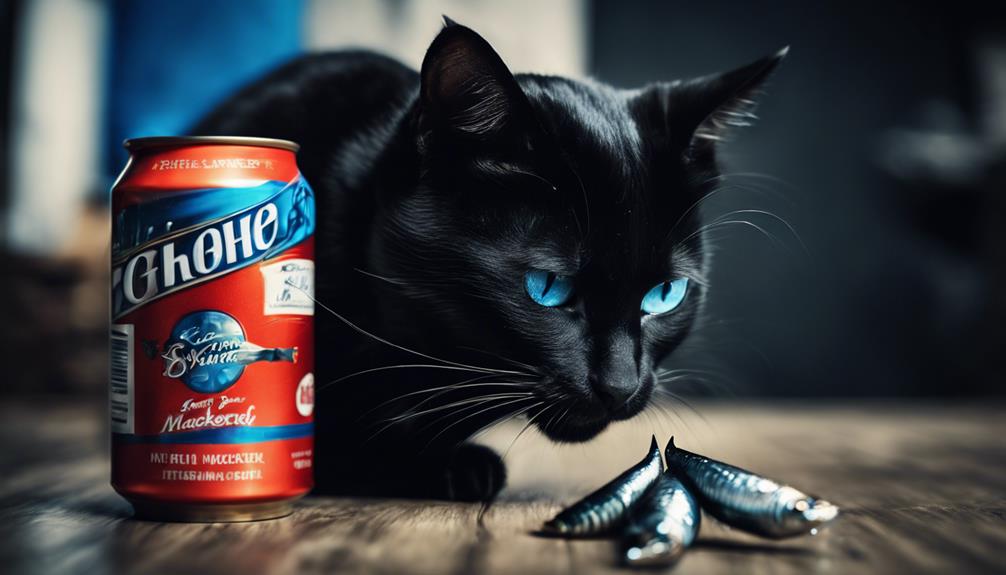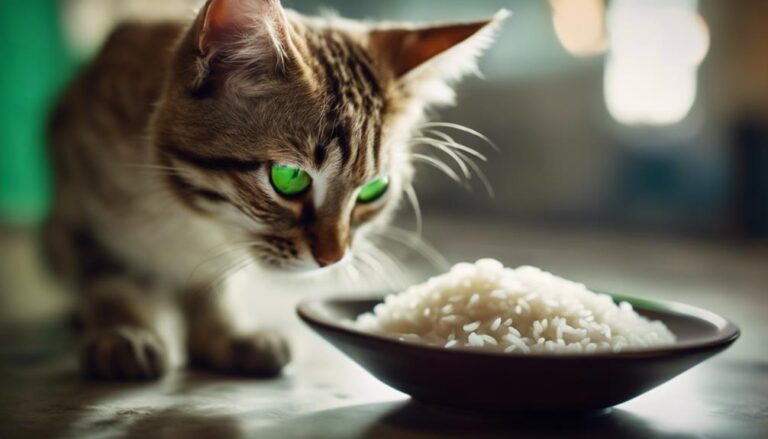If you're wondering whether cats can indulge in canned mackerel, the answer might surprise you. While cats can indeed enjoy this fishy delight, there are important considerations to keep in mind. The benefits are clear, but the potential risks could make you reassess your feline's seafood treats. Let's explore the nuances of this topic further to ensure your furry companion's well-being remains a top priority.
Nutritional Benefits of Canned Mackerel for Cats
Canned mackerel provides cats with essential nutrients that support their overall health and well-being. This fish is a fantastic source of omega-3 fatty acids, which are crucial for maintaining healthy skin and a shiny coat in your feline friend. The high-quality protein found in canned mackerel offers all the essential amino acids necessary for your cat's optimal health. Additionally, this fish contains vital vitamin B12, supporting your cat's immune system and nervous system function.
Feeding your cat canned mackerel can be a great way to ensure they receive the necessary nutrients for a balanced diet. The omega-3 fatty acids present in this fish help reduce inflammation and can even contribute to joint health in cats. The high-quality protein content supports muscle development and overall well-being. By incorporating canned mackerel into your cat's diet, you're providing them with a nutritious meal that offers a range of health benefits.
Risks of High Mercury Content
High mercury levels in canned mackerel pose risks to your cat's health. Mercury accumulation can lead to poisoning, affecting your cat's nervous system and overall well-being.
It's crucial to monitor serving amounts and opt for lower-mercury fish options to safeguard your cat's health.
Mercury Poisoning Risks
What dangers does consuming mackerel pose for cats due to mercury poisoning risks?
Cats face the risk of mercury poisoning when regularly consuming mackerel with high mercury content. This toxic metal can lead to severe health issues such as neurological problems and kidney damage in felines.
Due to bioaccumulation in larger predatory fish like mackerel, the levels of mercury can be dangerously high.
It's crucial to limit your cat's intake of canned mackerel to prevent the detrimental effects of mercury poisoning over time. Being cautious about the amount of mackerel your cat consumes can help safeguard their well-being and reduce the risk of mercury-related health issues.
Health Implications for Cats
Consuming mackerel with elevated mercury levels can pose significant health risks to your feline companion, including potential neurological issues and kidney damage. Mercury toxicity in cats can have severe consequences, leading to long-term health risks. It's crucial to monitor the mercury levels in canned mackerel to protect your cat's well-being.
Regularly exposing your cat to high mercury content can result in various health complications over time. To prevent mercury-related health issues in your cat, consider opting for low-mercury fish alternatives or limiting the intake of mackerel. Being mindful of the mercury levels in your cat's diet is essential for maintaining their overall health and ensuring they live a happy and healthy life.
Safe Serving Amounts
To ensure your cat's safety and well-being, it's important to moderate the serving amount of canned mackerel due to the risks associated with elevated levels of mercury.
While canned mackerel can be safely fed to cats, it's crucial to limit the quantity to prevent potential health issues. Opt for small portions of canned mackerel as an occasional treat for your feline companion.
Excessive consumption of mackerel can lead to mercury toxicity in cats, which can have severe consequences. Keep a close eye on the frequency and quantity of mackerel you offer to your cat to maintain their health.
Optimal Feeding Amount for Cats
When determining the optimal feeding amount of canned mackerel for your cat, consider serving it as an occasional treat rather than a regular meal. Cats can enjoy canned mackerel in moderation as part of a balanced diet. It's recommended to limit the intake of canned mackerel to once or twice a week to prevent overconsumption.
By treating mackerel as an occasional indulgence, you can help maintain a healthy diet for your feline friend. Keep a close eye on your cat for any adverse reactions or digestive issues when introducing mackerel into their diet. If you have any uncertainties about the appropriate feeding amount of canned mackerel for your cat, it's always best to consult with a veterinarian for personalized advice.
Choosing the Right Canned Mackerel
When selecting canned mackerel for your cat, focus on quality and freshness to ensure they receive the best nutrition.
Analyze the nutritional content of the mackerel to guarantee it meets your cat's dietary needs.
Remember to check for any harmful additives that could be detrimental to your cat's health.
Quality and Freshness
For optimal quality and freshness in the canned mackerel you choose for your cat, prioritize options labeled as human-grade. When selecting canned mackerel, consider the following to ensure the best choice for your feline friend:
- Look for sustainably wild-caught mackerel to support environmental practices.
- Opt for mercury-tested canned mackerel to ensure safe consumption for cats.
- Check for grain-free and non-GMO options in canned mackerel for better nutrition.
Choosing human-grade mackerel not only guarantees quality but also supports your cat's health benefits by providing essential fish oil without compromising on freshness and safety.
Nutritional Content Analysis
To ensure your cat receives optimal nutrition from canned mackerel, focus on the essential omega-3 fatty acids and minimal additives in the product.
Mackerel contains vital nutrients like omega-3 fatty acids, crucial for your cat's skin and coat health.
When selecting canned mackerel, opt for varieties with minimal additives such as salt or preservatives. Choosing mackerel canned in water instead of oil helps avoid unnecessary fats in your cat's diet.
Rotate between different canned fish options like tuna, salmon, and sardines to provide dietary variety.
Comparing Mackerel in Water Vs. Oil
Choosing between mackerel in water and mackerel in oil for your cat involves considering important nutritional factors. When it comes to canned fish, the type of packing can significantly impact your cat's diet. Here's what you need to know:
- Mackerel in water: This option is a healthier choice for your cat due to lower sodium levels compared to mackerel in oil. Water-packed mackerel helps avoid excess fats in your cat's diet, providing a leaner protein source without unnecessary additives.
- Mackerel in oil: Canned mackerel in oil typically contains vegetable oil, contributing to unnecessary fat intake for your cat. Opting for this version may introduce more fats into your cat's diet than needed.
Consider the health benefits and nutritional value when deciding between mackerel in water or oil for your feline friend. Prioritizing your cat's well-being by selecting the most suitable option can help maintain a balanced and healthy diet.
Handling Bones in Canned Mackerel
When feeding your cat canned mackerel, ensure to inspect the texture and size of any bones present before serving. Canned mackerel may contain soft and edible bones that are safe for cats to consume. These bones not only provide additional calcium and nutrients for your cat's diet but also help maintain their dental health as chewing on soft bones can be beneficial.
The benefits of mackerel in canned food extend to the inclusion of these bones, which are unlikely to cause choking or digestive issues in cats due to their soft nature. By checking the bones in the canned mackerel before feeding it to your cat, you can ensure a safe and nutritious meal for your feline companion.
Alternative Canned Fish for Cats
Consider incorporating different types of canned fish like tuna, salmon, and sardines into your cat's diet to provide a variety of high-quality protein and essential omega-3 fatty acids. These fish are a good source of nutrients that support a healthy feline diet. Here are some reasons why you should consider adding these fish options:
- Tuna, salmon, and sardines offer high-quality protein, aiding in muscle maintenance and overall health.
- These fish are rich in omega-3 fatty acids, promoting healthy skin and a shiny coat for your cat.
- Incorporating a variety of fish types ensures your cat receives a diverse array of nutrients, preventing nutrient imbalances and supporting a balanced diet.
Remember to opt for fish canned in water with no additives to ensure your cat receives the best nutritional benefits. Rotating between these fish types can provide your cat with a well-rounded diet while keeping their meals interesting and nutritious.
Frequently Asked Questions
What Canned Fish Is Safe for Cats?
When considering what canned fish is safe for cats, opt for choices like mackerel, tuna, salmon, and sardines. These provide vital nutrients and quality protein. Rotate between types for a balanced diet and choose minimally processed options for their health.
Is Mackerel or Salmon Better for Cats?
For cats, mackerel and salmon offer unique benefits. Mackerel is rich in omega-3 for skin health, while salmon provides vital vitamin D for bones. Both are excellent protein sources, so offering variety in their diet can be advantageous.
Can I Give My Cat Smoked Mackerel?
Avoid giving your cat smoked mackerel due to harmful additives like salt. Opt for fresh or canned mackerel instead. Smoking alters its nutrients and may contain chemicals unsuitable for your cat's digestion. Stick to safer options.
Can Cats Eat Mackerel in Sunflower Oil?
When considering mackerel in sunflower oil for cats, opt for water-packed mackerel instead. The added fats and calories in sunflower oil are unnecessary and can lead to weight gain. Choose the healthier option for your feline friend.






